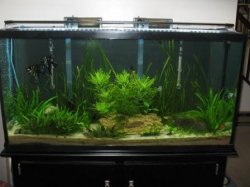Background (sorry for the longer post, but believe it provides helpful info):
I recently purchased my mom’s house. I had spent time there 6 years ago and had a 75 gallon tank. The house has public water and nitrates out of the tap were always zero.
I moved to a house with well water and the nitrates were ~20-30ppm out of the well.
In order to combat, I ro’d the water into a holding tank prior to water changes. I grew to 4 tanks – 2 120’s, a 75, and 5 gallon. I have been back in the hobby for about 7 years.
Fast forward to today. I moved all the tanks to new house (not fun at all). The TDS, KH, GH, and PH of the replenished RO water were very similar to the tap water at the new house.
At the new house, I have two 100 gallon Rubbermaid tubs that I pre-treat the water, using API’s Stress Coat to remove the chlorine/chloramines as well as letting water sit for 24 hours with air house and heater. The reason for two was I had aspirations of getting a centerpiece tank of say 200-250 gallons but sadly that has been put on hold.
After about two weeks I noticed some of the smaller fish in my tanks acting lethargic and then some not eating as consistently. After running through normal tests – 0, 0, ~40 I could not believe my nitrates were that high. I immediately went to the tap and found my answer. The tap was producing 20+ nitrates. I checked the water report on my township and sure enough – 2015 report - ~ range 1.7 – 4.7 NO3-N or 4.84 – 20.68 NO3 (possible 2016 could be higher). Maybe rules have loosened on farm fertilization or something causing more ferts to enter water ways.
I did some larger water changes to get the nitrates down to an ~ 20-30 range. BTW my nitrates at my old house with the well and RO water were always 5-10ppm.
It was a pretty demoralizing discovery about the nitrates. I don’t want to RO water again due to cost (if I had to I may consider, but wife would not be happy).
The idea I am exploring is growing pothos plants over my 100 gallon Rubbermaid tanks to try and remove some, if not all of the nitrates present in the tap water. A couple of questions that I am trying to answer are:
Thanks for reading and feedback is greatly appreciated. If anyone is open to chatting please hit me up.
Jason “jb”
I recently purchased my mom’s house. I had spent time there 6 years ago and had a 75 gallon tank. The house has public water and nitrates out of the tap were always zero.
I moved to a house with well water and the nitrates were ~20-30ppm out of the well.
In order to combat, I ro’d the water into a holding tank prior to water changes. I grew to 4 tanks – 2 120’s, a 75, and 5 gallon. I have been back in the hobby for about 7 years.
Fast forward to today. I moved all the tanks to new house (not fun at all). The TDS, KH, GH, and PH of the replenished RO water were very similar to the tap water at the new house.
At the new house, I have two 100 gallon Rubbermaid tubs that I pre-treat the water, using API’s Stress Coat to remove the chlorine/chloramines as well as letting water sit for 24 hours with air house and heater. The reason for two was I had aspirations of getting a centerpiece tank of say 200-250 gallons but sadly that has been put on hold.
After about two weeks I noticed some of the smaller fish in my tanks acting lethargic and then some not eating as consistently. After running through normal tests – 0, 0, ~40 I could not believe my nitrates were that high. I immediately went to the tap and found my answer. The tap was producing 20+ nitrates. I checked the water report on my township and sure enough – 2015 report - ~ range 1.7 – 4.7 NO3-N or 4.84 – 20.68 NO3 (possible 2016 could be higher). Maybe rules have loosened on farm fertilization or something causing more ferts to enter water ways.
I did some larger water changes to get the nitrates down to an ~ 20-30 range. BTW my nitrates at my old house with the well and RO water were always 5-10ppm.
It was a pretty demoralizing discovery about the nitrates. I don’t want to RO water again due to cost (if I had to I may consider, but wife would not be happy).
The idea I am exploring is growing pothos plants over my 100 gallon Rubbermaid tanks to try and remove some, if not all of the nitrates present in the tap water. A couple of questions that I am trying to answer are:
- Will this work, working for me would be removing at a minimum 50% of the nitrates? I understand it may take 6 months or so to get the plants to where they can consume this much but at least I will feel like it is worth it if I can get 50% or more removal of nitrates?
- What minerals if any would I need to put back in the water before adding to fish tanks that the plants would absorb? I still have my seachem equilibrium that I could add back if I had to.
- Will I have to add something like Seachem Flourish or will present nitrates be enough for plant growth?
- What other challenges might I run into to?
Thanks for reading and feedback is greatly appreciated. If anyone is open to chatting please hit me up.
Jason “jb”



 /www3.epa.gov/watersense/pubs/indoor.html
/www3.epa.gov/watersense/pubs/indoor.html